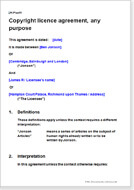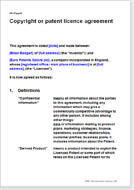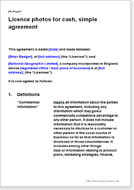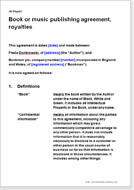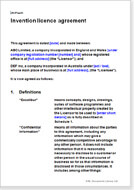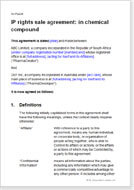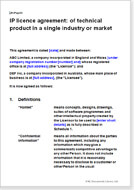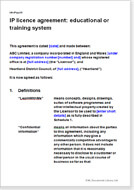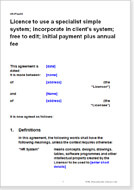Intellectual property licence agreements
These intellectual property licence agreements allow the licensee to use written text, software, images, music, inventions, designs, systems, plans, objects or any other IP in as wide or narrow a range of circumstances as you choose. These are flexible contracts that protect your interest and enable a smooth and reasonable deal.
Copyright licence agreement, any purpose
This is a simple copyright licence agreement whereby the owner of the copyright work grants a licence for a specified sum of money, for some other person to exploit his work. You can use this agreement for any sort of created work, for a specific time period or in perpetuity.
Copyright or patent licence agreement
This is a licence of a patent to someone who will exploit it through sub licences. The licensor will take a cash payment or royalty, or both. Example: a patented device, part or sub-assembly which requires to be incorporated into a product for use.
Licence photos or videos for cash, simple agreement
This is a straight forward licence of a set of photos or videos or both. Provides for sub-licence. Perfect for amateur or professional photographer to licence his work in any medium.
Book or music publishing agreement, royalties
This is a straight forward but comprehensive publishing agreement for use by either an author/composer or a publisher. It is a flexible agreement, providing an ideal framework for publishing any created work.
Invention licence agreement
This is a heavyweight licence agreement for rights in an invention. The product could be an innovative new product for sale or a device to improve an existing product. It could be a device for dogs to get their own meals or a steering system for supersonic drones. The licence is flexible, but drawn in present form as a licence in perpetuity for a particular industry. It assumes a single fee and/or a royalty. It is also assumed that the licensee will require a licence to use supporting systems, in common with licensees in other industries.
IP rights sale agreement: in chemical compound
This is an agreement for the restricted sale of rights in a chemical compound. It may be any compound for any purpose. Your buyer will have a particular purpose in mind. You will want to limit the sale by reference to place, end product, industry type or any other. Payment by up front cash plus royalty. Provides for ongoing mutual co-operation in R&D or other.
IP licence agreement: of technical product in a single industry or market
This is a heavyweight licence agreement for rights in an invention. It could be any technical IP. This agreement is for an invention or improvement which could be used in more than one industry. The owner/inventor will licence it widely, but to only one licensee per industry or sector. The Licence is perpetual, irrevocable, non-exclusive, fully paid-up, royalty-free and worldwide. The licensee is therefore entirely free to incorporate it into any product he makes, provided it is in his industry only. Includes more limited licence for supporting IP - maybe a patent or trade mark or the right to some system or device. It is also assumed that the licensee will require a licence to use supporting systems, in common with other licensees.
IP licence agreement: educational or training system
This is a heavyweight licence agreement for a "How to" product; for example an educational or training system, or a system for psychometric testing. Your product is likely to be provided as a CD or DVD, maybe with hard copy or hard product support. The licence is flexible. It assumes a single fee and/or a royalty. It includes many options, for example that the licensee will require a licence to use supporting systems, in common with your other licensees.
Licence to use specialist simple system
This is a licence agreement for your piece of software and layout to be incorporated in one or more other software systems or applications. It may facilitate use of a record-keeping process or facilitate compliance with statutory requirements. The range of possibilities is without limit. You license for single use only, not for re-sale or for use in a product for mass sale. Initial payment, with option for annual payment for support.

If the document isn’t right for your circumstances for any reason, just tell us and we’ll refund you in full immediately.

We avoid legal terminology unless necessary. Plain English makes our documents easy to understand, easy to edit and more likely to be accepted.

You don’t need legal knowledge to use our documents. We explain what to edit and how in the guidance notes included at the end of the document.

Email us with questions about editing your document. Use our Lawyer Assist service if you’d like our legal team to check your document will do as you intend.

Our documents comply with the latest relevant law. Our lawyers regularly review how new law affects each document in our library.
License rights to use IP using these documents
These agreements allow you to grant use of your intellectual property to someone else whilst retaining ownership in the long term.
Intellectual property encompasses many types of created work, from images and designs to processes and systems. IP can even be a combination of other works.
However, the majority of deals in IP require similar provisions. So, a licence of rights in a set of magazine articles is not dissimilar from a licence of design rights for manufacture. For that reason, our documents can be used for a very wide range of alternative deals and arrangements.
It follows that when you look for a document, look for a description that is similar to, or matches your deal, not just a title that references the same type of IP that you wish to license.
Who should use these documents?
These documents can be used by either the owner of the IP (most likely the creator) or the licensee.
Most contracts are written to favour the interests of one party over the other. However, most of these documents are written so as to be fair to both sides (even if one side is favoured). The reason is that any arrangement that is intended to be continuous for any period of time requires mutual co-operation.
Our guidance notes explain each paragraph so that you don’t need prior experience of licensing intellectual property to edit one of our documents.
Strong legal documents
We describe some of our documents as simple. That does not mean that the legal effect of the document is not strong, but rather that the document is uncluttered by supplementary provisions like options for support, sub licences, licence back, and so on.
Similarly, a “heavyweight” document contains many options. You are unlikely to use all of them, but they will bring to your attention ideas that you may not previously have considered. Of course, you can easily edit out those that you decide not to use.
Limiting the use of the licence you grant
All our documents allow you flexibility to grant a licence to use the IP subject to conditions that you decide.
For example, you could limit use in certain countries or for certain purposes.
Limiting the circumstances in which the IP can be used lets you license the same IP multiple times to different people or businesses in order to maximize the return on your work.
It also might the case that your work has a component that is the intellectual property of someone else, and that you don’t have a permit to sublicense it in certain circumstances.
What you will find in your document
So far as applicable, our documents cover:
Named people and products
In many documents we have given a fictitious name to a party or product. We do this to make it easier for you to follow what the document is about. Of course, you will need to edit the document to use your own comparable names or generic ones.
Complete legal framework and commercial structure
Every agreement provides a complete structure for a deal. We cannot mention every smallest point, but you can reckon that if you need it, we have thought of it. If you have special requirements, we can always help further with our review service.
International deals
Our templates will help you to create a document that holds water in any jurisdiction.
However, every country has its own laws, so we cannot guarantee what a judge in Panama or Portugal might say. However, you will always be able to terminate a Net Lawman agreement for breach of a term.
Support by the owner or creator to the licensee
Many arrangements to exploit intellectual property involve a prime deal concerning specific IP and also a secondary deal for ongoing support. Where this support may include a second licence for additional IP, we provide for it.
There are two reasons why you might wish to protect this additional support material more strongly:
- First, the supporting material may have far wider application. You might want to use it in the same market for other applications, or in other products and other markets.
- The second reason is that you may not own all the supporting material. You may yourself use in the material some IP that has been licensed to you from others. So, all you can do is to sublicense under whatever conditions you can do so.
These terms can easily be edited to suit your deal, or be deleted if you do not require them.
Preserving moral rights
The right of a creator of a work to be recognized is enshrined in law. Nonetheless, we do mention it in many agreements.
Protecting your rights
Who must sign?
Unlike a manufacturer of physical products, a licensor of IP rights can be up against theft on a large scale. It is very easy for a single individual to steal your rights or disclose your secrets. When your deal is with a company, only that company is bound. If one of its employees steals your secrets, all you can do is rely on your copyright.
Copyright needs no registration. In law, you can simply prove that you are the originator and you have not given permission and you are home and dry in a court claim. But that leaves two problems:
- you do not want to have to go to court
- when someone beaches your copyright, your “work” is immediately spread around, making it far harder to control and to catch further thieves.
While no legal document can guarantee to prevent theft, there are three small points that will help you (all of which we include in our documents as appropriate):
- word the signature point so that the person signing also takes personal responsibility
- insist on a personal guarantee
- have the document signed by every member of the team who will be dealing with the work
What you can do in practice of course depends on what your IP is, how easily it is stolen and whether your counter-party will agree.
Who owns copyright?
You need to be aware that the law differs in the USA from South Africa and most other Western countries.
As far as we are aware, in most countries, intellectual property created by an employee is owned by the employer.
However, ownership of IP created under a contract is far less clear. In the USA, they use a term “work made for hire” to describe work done by a person who is not an employee. All such work belongs to the creator. So, if you contract with a US designer for artwork for your website, that work remains his and not yours. What you get is a permit to use it forever, on your site.
It is therefore best, when you commission work from an originator, always to include the point that “the resulting work shall be the property of” you.
All rights reserved

